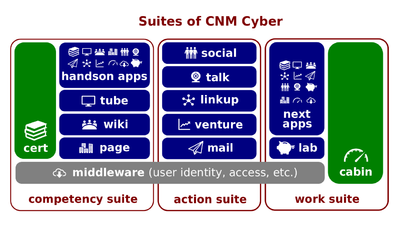Difference between revisions of "CNM Cloud SSO"
| Line 1: | Line 1: | ||
| − | [[File:Cnm-digital.png|400px|thumb|right|[[CNM Cyber suite]]s]][[CNM Cloud SSO]] (hereinafter, the ''Lectio'') is the [[lectio|lesson part]] of the '''[[Cloud on the Web]]''' [[lesson]] that introduces its participants to [[CNM Cabin]]. This ''lesson'' belongs to the [[Introduction to CNM Cloud]] session of | + | [[File:Cnm-digital.png|400px|thumb|right|[[CNM Cyber suite]]s]][[CNM Cloud SSO]] (hereinafter, the ''Lectio'') is the [[lectio|lesson part]] of the '''[[Cloud on the Web]]''' [[lesson]] that introduces its participants to [[CNM Cabin]]. This ''lesson'' belongs to the [[Introduction to CNM Cloud]] session of [[Employableu Foundation]]. |
Revision as of 23:36, 2 March 2023
CNM Cloud SSO (hereinafter, the Lectio) is the lesson part of the Cloud on the Web lesson that introduces its participants to CNM Cabin. This lesson belongs to the Introduction to CNM Cloud session of Employableu Foundation.
Content
The predecessor lectio is DNS of CNM Cloud.
Script
- WorldOpp Middleware supplies every other CNM Cyber service with your username and password. That means that you can log into any service of CNM Cyber with the same identity credentials. However, at this moment, you need to log in every service separately. I.e. every Certified CNM Cyber User needs to type his or her username and password over and over again while switching to another system.
- To simplify the authorization process and to make it more secure, the CNM Cyber Workforce plans to implement something called single sign-on, which is also known by its acronym SSO. When implemented, you would be logged in automatically in every service when you logged in any. Every logging-in of yours would initiate your session with CNM Cyber and you would be able to switch between services without additional typing of your credentials.
Key terms
- Authentication, identity credential, username (login name, account name), password (passcode), single sign-on (SSO)
Closing
What Competency Suite Is is the successor lectio.
